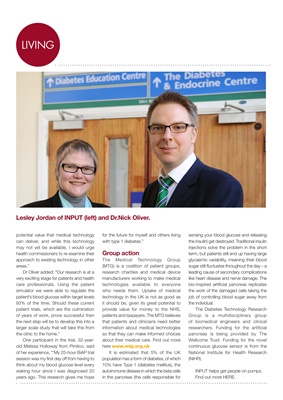
LIVINGLIVINGLIVING
the condition. It's another example of the
potential value that medical technology
can deliver, and while this technology
may not yet be available, I would urge
health commissioners to re-examine their
approach to existing technology in other
areas."
Dr Oliver added: "Our research is at a
very exciting stage for patients and health
care professionals. Using the patient
simulator we were able to regulate the
patient's blood glucose within target levels
93% of the time. Should these current
patient trials, which are the culmination
of years of work, prove successful then
the next step will be to develop this into a
larger scale study that will take this from
the clinic to the home."
One participant in the trial, 32 year
old Melissa Holloway from Pimlico, said
of her experience, "'My 25-hour BiAP trial
session was my first day off from having to
think about my blood glucose level every
waking hour since I was diagnosed 20
years ago. This research gives me hope
for the future for myself and others living
with type 1 diabetes."
The Medical Technology Group
(MTG) is a coalition of patient groups,
research charities and medical device
manufacturers working to make medical
technologies available to everyone
who needs them. Uptake of medical
technology in the UK is not as good as
it should be, given its great potential to
provide value for money to the NHS,
patients and taxpayers. The MTG believes
that patients and clinicians need better
information about medical technologies
so that they can make informed choices
about their medical care. Find out more
here www.mtg.org.uk
It is estimated that 5% of the UK
population has diabetes (Type 1 and Type
2), of which 10% have Type 1 (diabetes
mellitus). This is an autoimmune disease
in which the beta cells in your pancreas
(the cells responsible for sensing your blood glucose and releasing the
insulin) get destroyed. Traditional insulin
injections solve the problem in the short
term, but patients still end up having
large glycaemic variability, meaning their
blood sugar still fluctuates throughout
the day - a leading cause of secondary
complications like blindness, heart
disease and nerve damage. The bioinspired
artificial pancreas replicates the
work of the damaged cells taking the job
of controlling blood sugar away from the
individual.
The Diabetes Technology Research
Group is a multidisciplinary group
of biomedical engineers and clinical
researchers. Funding for the artificial
pancreas is being provided by The
Wellcome Trust. Funding for the novel
continuous glucose sensor is from the
National Institute for Health Research
(NIHR).
INPUT helps get people on pumps.
See more HERE.
Lesley Jordan of INPUT (left) and dr.nick Oliver.